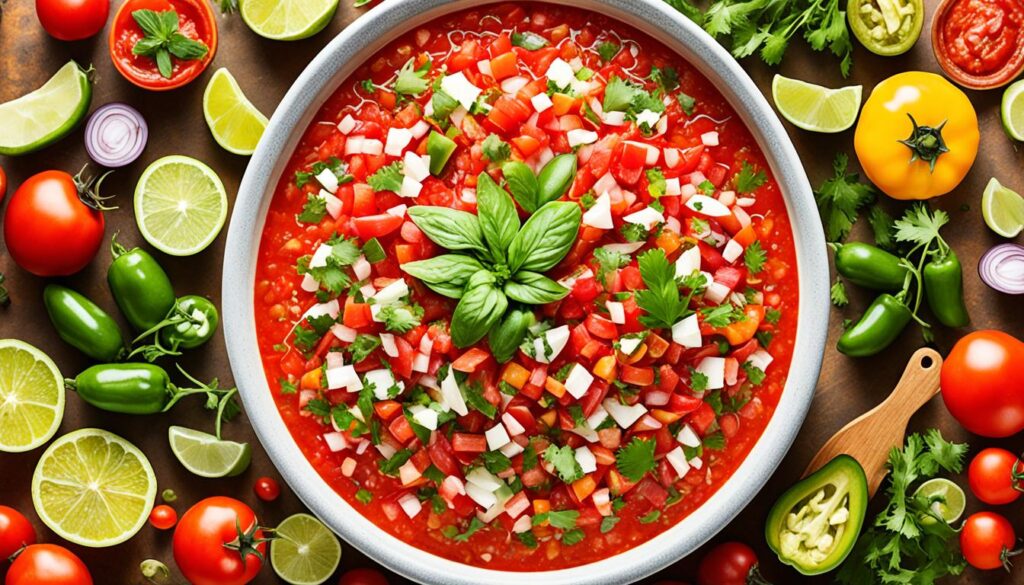Are you ready to spice up your entrepreneurial journey? Starting a salsa business could be your path to success in the food industry. The salsa market is growing fast, offering many chances for creative people to make unique flavors. Whether you like mild or hot salsa, there are endless options in salsa making.
Starting your own salsa company takes more than a great recipe. You need to know the market, follow the law, and market well. But with hard work and the right plan, you can make your salsa passion a successful business.
You can dream of your jars in supermarkets or at farmers’ markets. The salsa industry has many ways to succeed. Starting costs can be $2,000 to $10,000, based on your goals and what you need.
Key Takeaways
- The salsa industry offers diverse opportunities for entrepreneurs
- Starting a salsa business requires more than just a great recipe
- Initial investments can range from $2,000 to $10,000
- Understanding market trends is crucial for success
- Legal requirements and food safety regulations are essential considerations
- Starting small at local markets can be a good entry point
Understanding the Salsa Market
Entering the salsa market is exciting, full of flavors and chances to grow. To succeed, you need to know about salsa types, market trends, and profit margins.
Types of Salsa to Consider
The salsa market has many options to please every palate:
- Garden Fresh: Packed with crisp vegetables
- Red Salsa: Classic tomato-based favorite
- Green Salsa: Tangy tomatillo blend
- Specialty Salsas: Unique flavors like mango or black bean

Current Market Trends
Health-conscious choices and bold flavors are big in the salsa market. People want unique ingredients and real recipes. Low-sodium and organic salsas are getting more popular, like in BBQ sauce businesses.
Potential Profit Margins
Knowing about salsa profit margins is key for your business plan. Margins are usually around 20%, so you need to sell a lot to make money. Successful salsa companies aim to sell 30,000 to 40,000 jars each month.
The market is tough, with big names like Pace Foods leading the way. But, with a unique recipe and smart marketing, you can stand out in this tasty market.
Developing Your Signature Salsa Recipe

Creating a unique salsa recipe is key to standing out. Your signature salsa should capture taste buds and keep customers coming back. Start by experimenting with different ingredients to find the perfect blend of flavors.
Quality ingredients are crucial for salsa recipe development. Choose fresh produce and top-notch spices to ensure your salsa shines. Consistency in taste is vital, so perfect your recipe before scaling up production.
Consider offering a variety of salsa flavors to cater to different preferences:
- Classic tomato-based
- Fruity mango or pineapple
- Spicy habanero or jalapeño
- Smoky chipotle
When developing your signature salsa, keep in mind that scaling up from a home kitchen recipe to commercial production may require adjustments. You might need to work with food scientists to maintain quality and consistency at larger volumes.
Don’t forget about nutritional analysis for accurate labeling, especially if you plan to make health claims. Proper licensing and regulatory compliance are essential when selling canned goods like salsa.
By focusing on unique flavors and high-quality ingredients, you’ll be well on your way to creating a signature salsa that sets your business apart in the competitive market.
Legal Requirements and Licensing
Starting a salsa business means you have to follow the law. You need to know about licenses, food safety, and labeling. These are key for your business to succeed.
Food Handler's Permits
Food handlers in most states need permits. These make sure you know how to keep food safe. To get one, you must finish a food safety course and pass a test. Your local health department can tell you what you need.
Kitchen Regulations
Your place for making salsa must be very clean. Many start in commercial kitchens to follow the rules. These kitchens are ready for health inspections and save time and money.
Labeling Requirements
Right labeling is key for following the law and keeping customers safe. Your labels must have:
- Product name
- Net weight
- Ingredient list
- Allergen warnings
- Nutritional information
- Your business name and address
Rules can change by state and place. Do your homework and talk to a food safety expert. This way, you make sure your salsa business follows all the laws.
How to Start a Salsa Business: Step-by-Step Guide
Are you ready to add some spice to the market with your salsa business? Let’s start with a step-by-step guide. First, create a strong salsa business plan. This plan will cover your goals, who you want to sell to, and how much money you expect to make.
After that, get the right permits and licenses to follow the law. Once you have these, it’s time to set up your salsa manufacturing spot. This could be a commercial kitchen or your own home, but it must be clean and safe.
Then, find top-quality ingredients and packaging to make your salsa unique. With your product ready, it’s time to think about salsa distribution. Begin by selling at local farmers’ markets or specialty stores. This helps you test your product and get feedback from customers.
As more people want your salsa, look into growing your business. You can follow the path of other successful entrepreneurs by finding new ways to reach more people. Check out this link for tips on growing your business.
Building good relationships with suppliers and knowing your customers well are crucial for success. Be ready for the challenges of making more salsa and managing your money as your business gets bigger. With hard work, a great product, and a bit of luck, you could become a big name in the salsa world!
FAQ
What types of salsa should I consider making?
What are the current market trends for salsa?
What are the potential profit margins in the salsa industry?
How can I develop a unique and appealing salsa recipe?
What legal requirements and licenses do I need for a salsa business?
What are the key steps to start a salsa business?
Author
-

Lucas Martinez is an accomplished entrepreneur with a passion for startups. He has launched and scaled multiple businesses, providing pragmatic advice on starting and growing a business.
View all posts



